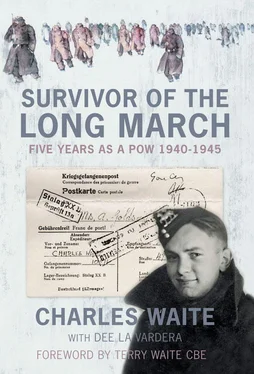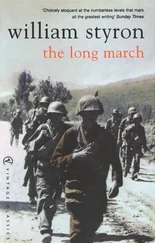Survival. That was what we focussed on. You concentrated on the walking, watching your feet and the boots of the men in front and getting into the rhythm. Nobody wanted to fall behind. God help you if you got detached. And when other groups of men gradually joined us along the way, it was even more important to stick together and not get separated. Even though we hadn’t a clue where we were going, we thought, ‘Better the devil you know. Stick with your mates.’
We were fortunate, my pals and I, to be at the back of the line so the first men in front were clearing a path which made it easier for us. We still had to battle through deep snow sometimes up to our chests, sometimes digging it away by hand, other times stopping to get shovels off the back of cart while the guards looked on. It was exhausting. Every icy breath drawn in hurt your lungs and made your teeth and head ache. Every movement was painful. Every step dangerous. It was so slippery that you had to watch every step so you didn’t fall. I thought about our horses at home, how I used to take them to the blacksmith’s in winter to have studs put in their shoes for the bad weather. We could have done with some of those on our boots to give us a bit of grip. It was never this like in Essex even during the worst winters. Such a struggle just to be able to walk a few hundred metres. Would there ever be an end to this torture?
Always the snow and the ice. It was the continuous gnawing cold which made your eyes water except the tears froze and glued your lids together. Even with a scarf wrapped round, your cap on, and coat collar up, your head ached as though somebody was banging an ice cold hammer through your brain. Even with two pairs of socks on, your feet were so cold you had to look down and check that they were still there at the end of your legs. Even if you had gloves or your homemade mittens on and stuffed your hands deep into your pockets you could still feel them burning with cold as though they were being held over a hot flame. Utterly, utterly miserable.
There was a plan of sorts – to go in a westerly direction from camp to camp – but it didn’t always work out like that. We didn’t know the route and I don’t think the guards did either half the time. Sometimes we walked for days in huge circles coming back to where we started. Cries went up: ‘Christ in heaven, we’ve been here before!’ or ‘Where in f------ hell are we going?’ but it made no difference. We just carried on. We followed orders. With guards carrying machine-guns you just did. No questions asked. In spite of having walked all day, it was so cold that gangs of men got into circles at night to keep warm and continued walking round and round; others were so frightened to lie down and go to sleep that they used to prop each other up as they snatched a few minutes sleep here and there.
Not long after we started on The March, we began picking up other POWs – twenty, thirty or forty men at a time, until we had a steady column of about 100–150 men. It was a shifting and changing group. Some stayed a few days to rest or work and moved off again and some others would join us. Some of our original guards stayed for quite a while but as time went on, older men replaced the younger ones who left, called back to fight the Allied advance from the west and the Russian Army from the east.
One of the first groups to join us was a bunch of American airmen who were pulling homemade sledges. They seemed very well-prepared with woolly hats and scarves wrapped round their heads and some had fur mittens, even goggles. We were very envious of them with their belongings packed neatly on the sledges even though it was probably quite difficult pulling them along on the ice and through the thick snow.
They looked pretty fit and well fed to me and we learned that they had only been prisoners for three months. When we told them how long we had been POWs they were shocked. ‘Jeez, no wonder you guys look like death warmed up!’ They could see in our haggard faces that we had suffered a lot. Of course, most Yanks love the Brits and everything British and as they had been stationed over in England they waxed lyrical about our countryside and village pubs but mainly our food. ‘Oh, we love your fish and chips’ and ‘How about those steak and kidney pies?’ How much they missed them. If they missed them, what about us? I did think it was insensitive of them going on about our wonderful food when we were starving but at least they shared a cigarette or two with us and a bit of chocolate. One good thing about smoking was that it curbed your appetite. Our stomachs had shrunk over the years so we were used to eating very little but it was still hard, very hard to cope in these conditions.
Our bits and pieces from the Red Cross parcels were soon eaten up and we relied on the handouts of stale bread distributed by the guards. Keeping warm by moving was more important than eating. You didn’t want to sit down or your trousers would freeze to the ground. You didn’t want to take your hands out of your pockets even if you had strips of old blanket wound round them because the tips of your fingers would get frostbite. At times groups managed to clear a small area and light a fire or two and make a brew with melted snow and a few tea leaves from someone’s pocket. We would pass the bowl around the lucky men in the group. It reminded me of happier times felling trees in the Rosenberg forest.
Hebby managed to make notes during the journey in a diary which he had taken from the blacksmith’s where he had worked. He kept track of places and distances we covered. I don’t know how he worked out how far we walked each day because we didn’t always see sign posts or know which places we’d been through but he was the sort of person who kept his eyes peeled, listened to other people and picked up information that way. What he wrote down helped me when I jotted down my own notes using the blank pages of my New Testament. I brought this home with me but it was not the original one with which every soldier was issued on enlistment. I was given this book about a week into the March by a padre I met in a church. It is stamped inside Stalag 2B Geprüft – meaning ‘ examined’, so it came from another camp.
I received this [New Testament] on 28th Jan 1945
During a halt on The March
About 1,000 of us in a church.
One of our boys is now playing the organ
As we walked on and on through villages and towns we began to see the effects of the war and the damage caused by the Allied bombing raids. It was dusk, after another long day walking, when we came to a large town or the outskirts of a city. It looked much the same as all the other places in the evening gloom with smashed vehicles – carts and cars, boarded up buildings, empty houses and deserted streets. There was a church standing in a square littered with stones and rubble. Some of the guards went ahead and must have checked it out because we started moving slowly in that direction. It was large with fancy stonework and buttresses and steps up to the main doors.
As usual we were at the back of the column following the others in straggly groups as they made their way towards the entrance. It took us a while to get there so we were the last to go in. Somewhere dry for the night. Fantastic! A couple of guards were having a quick smoke and then moved on inside. When we got in through the big heavy front door it was dark inside. We were in a wide, narrow, dark vestibule with steps and passageways off to the side. In the gloom I could make out the shapes of fellows hunched up asleep in a corner and moved past them towards the inside door. Sid and Heb were ahead, already poised to open it and go inside the church.
It was Jimmy, of course, who spotted it, always on the lookout for opportunities to make his and our lives better. He obviously had an idea.
Читать дальше




![Джеффри Арчер - The Short, the Long and the Tall [С иллюстрациями]](/books/388600/dzheffri-archer-the-short-the-long-and-the-tall-s-thumb.webp)







